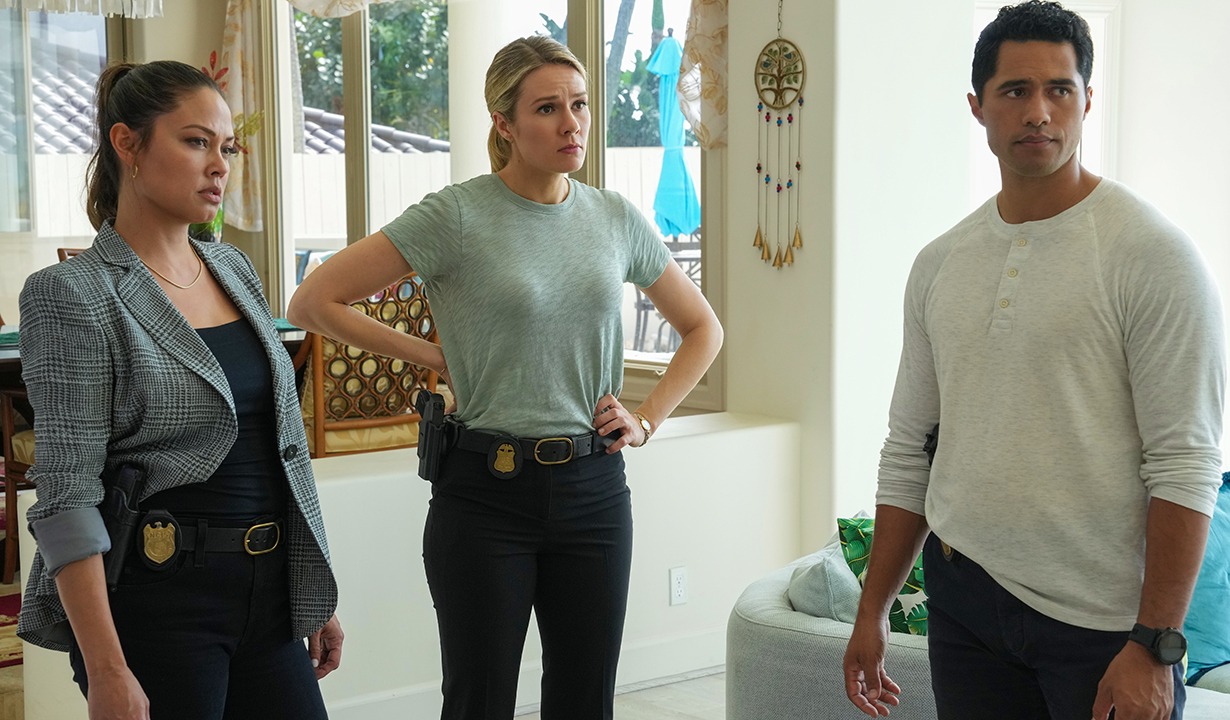
NCIS: Hawai’i’s cancelation already caused a major backlash against CBS, but now I’m more confused about their decision to pull the plug on the series after learning about their new in-development series. Once the flagship series was established, the network found ways to expand the NCIS franchise by launching several spinoffs. Many of them became successful, and most importantly built a solid fan base. NCIS: Hawai’i was the youngest Stateside local offshoot, only debuting in 2021. But in three years, which includes a shortened final season, even I recognize that it has a loyal and committed following. I must admit, I’m late boarding the NCIS: Hawai’i train. I have only started watching the spinoff, after hearing great things about the offshoot. Despite this, I have been closely following the uproar that CBS has gotten since NCIS: Hawai’i was canceled. For context, the network also pulled the plug on So Help Me Todd and CSI: Las Vegas, but while I’m sure that there’s also a backlash against them, nothing comes close to the criticism they have gotten for ending the NCIS spinoff.
Let’s just cut to the chase—CBS canceling NCIS: Hawai’i was already a head-scratcher. But now? With the revival of another procedural show that was long gone and largely forgotten? Yeah… I’m more confused than ever. In this article, we’ll dive into the murky waters of network television decisions, dissect CBS’s logic (or lack thereof), and explore why NCIS: Hawai’i getting the boot feels more unjust by the day.
Why Did CBS Cancel NCIS: Hawai’i in the First Place?
Loyal Fanbase Left Hanging
NCIS: Hawai’i wasn’t just a spin-off—it built a community. The characters were finally getting depth, the storylines were finding rhythm, and fans were invested.
So when CBS said goodbye after just three seasons, the reaction was: “Wait—why?”
Ratings Were Steady (If Not Spectacular)
Was it setting record-breaking numbers? No. But it wasn’t tanking either. It held decent ratings and was part of a brand that’s consistently brought in viewers for decades. That kind of stability isn’t easy to come by.
Behind-the-Scenes Budget Cuts?
Insiders whispered about tightening budgets. Network reshuffles. Streaming priorities. But even then—does it justify cutting loose a show that still had gas in the tank?
CBS Brought Back What Show? Seriously?
An Unexpected Revival
CBS recently shocked viewers by reviving a procedural show that had already seen its final curtain. And while nostalgia is powerful, this particular choice has everyone doing a double-take.
Revival vs. Continuation
There’s a key difference: reviving a dormant show requires new investment, reassembled casts, and risk. Meanwhile, NCIS: Hawai’i was already up and running with story arcs ready to bloom.
So why cancel a live show to pump resources into a risky reboot?
What This Says About Network TV Logic
Legacy Doesn’t Always Protect You
Being part of the NCIS franchise isn’t the bulletproof vest we once thought it was. Even with franchise power, NCIS: Hawai’i wasn’t safe.
It’s Not About Quality Anymore
Let’s be real. A lot of viewers feel like network decisions are no longer about story quality or viewer loyalty—but spreadsheets, demographics, and boardroom vibes.
Reviving Nostalgia Over Nurturing Growth
Reviving an old hit might grab headlines, but nurturing a growing fan favorite builds longevity. CBS seemed to have chosen the former.
NCIS: Hawai’i Was Just Hitting Its Stride
Character Development Was Flourishing
Jane Tennant (played by Vanessa Lachey) was becoming a true NCIS powerhouse. Complex, bold, and layered—she brought something fresh to the franchise.
Storylines Were Getting Bolder
From global crimes to local drama, the show was expanding beyond formula. It was carving a unique identity, not just riding the franchise’s coattails.
Fan Reactions: Outrage and Confusion
Twitter Went Wild
#SaveNCISHawaii started trending. Fans posted petitions, rewatches, and video tributes. Clearly, people cared—a lot.
Online Petitions Gained Steam
Within hours of the cancelation announcement, tens of thousands signed to bring it back. That doesn’t happen with forgettable shows.
The Procedural Formula Isn’t Dead—It Just Evolved
Modern Procedurals Need Character + Plot
It’s not enough to have a crime-of-the-week anymore. Viewers want layered leads, serialized arcs, and emotional payoffs. NCIS: Hawai’i delivered all that.
Hawaiian Setting Offered Fresh Appeal
The setting wasn’t just a backdrop—it brought cultural depth, diversity, and unique storytelling angles rarely explored in network crime shows.
Representation Matters—And NCIS: Hawai’i Was Winning
Female Lead at the Helm
Jane Tennant wasn’t just a token female lead—she owned her space. That’s rare in procedural TV, and fans noticed.
Cultural Representation of Hawai’i
The show wove in local Hawaiian culture with respect and consistency. That’s not just entertainment—it’s visibility.

The Risk of Alienating Loyal Viewers
CBS has long relied on loyal viewers who stick with shows for years. Canceling a show like NCIS: Hawai’i sends a weird message: even if you’re loyal, we might pull the plug.
That’s not a great vibe.
Was There Another Way?
Why Not Move It to Streaming?
If costs were the issue, why not shift it to Paramount+? Other shows have found second life there.
Shorter Seasons Could’ve Worked
A 10-episode run or a special event mini-series could have tied up loose ends and satisfied fans—without burning bridges. While we won’t name names (you know who you are), CBS’s revived procedural didn’t exactly end on a high note the first time around. The fanbase is smaller, the momentum is weaker, and the buzz? Lukewarm. It’s a curious pick—and makes the NCIS: Hawai’i cancelation sting more.
Final Thoughts: This Decision Still Doesn’t Make Sense
Look—networks make tough calls. But this one? Still feels like a miss.
NCIS: Hawai’i had legs. It had fans. It had potential. And now, we’re watching CBS funnel energy into reviving a procedural that most viewers barely asked for. It’s not just baffling—it’s backward.